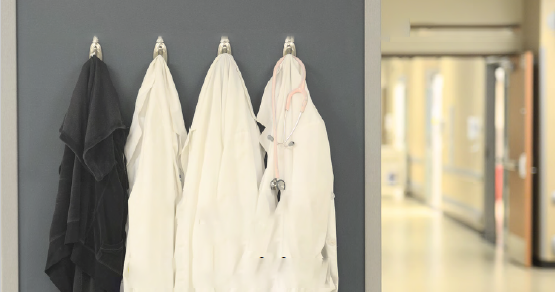Two months into my intern year, I had my first case presented at Morbidity & Mortality conference.
An elderly man with metastatic prostate cancer came in with back pain and known spinal lesions. While his neurologic exam was initially normal, he developed paraplegia within hours, and it was missed. I was crushed. Ten years of undergraduate and graduate education spent aiming to be at the top of my game, only to fail a patient so early in my residency training? It made for a tough transition from medical student to physician.
And here we are again, on the brink of another transition.
The start of a new academic year is full of anxiety as we all step into our new roles, regardless of what level we’ve reached in training. It’s part of the medical maturation process. But this year, it just feels… different.
Being on the front lines of COVID-19, it seems as though we’ve matured years in just a matter of months, in many ways. Yet there’s still this uneasiness as we step into our new roles, particularly in the setting of delayed rotations, canceled electives, and fluctuating patient volumes. Pre-coronavirus, we would have had time to reflect on the year we just finished, prepare for the year ahead, maybe even take that vacation we’ve been dreaming about forever.
But now?
Now, we've endured weeks of unremitting high alert. We've been, by turns, overwhelmed by volume and driven to distraction by eerily empty ED waiting rooms. Our students are sidelined, our graduates are facing unexpected unemployment, and we don't know what this year will bring.
It doesn't make for the smoothest transition of all time.
As I shift from running our Shock and Resuscitation Unit as a third-year resident to supervising interns as a fourth year, I worry. Have my extracurricular interests pulled me away from keeping up with evidence-based medicine? Have I run enough resuscitations of critically ill patients? What if my interns know more than me when I’m supposed to be the one teaching them?
The spiral always ends with the same question: Am I good enough?
Having an early M&M case shook my confidence, and the same can be true for role transitions. Self-doubt can be either debilitating or harnessed as a tool for growth. Here are 3 reminders that get me out of the imposter syndrome spiral:
1. Don't be afraid to say, "I don't know."
Regardless of where you are in training, no one expects you to know it all, and this is especially true for early interns who are just getting used to being called "Doctor." As my chief resident told me early in my intern year, "If you were expected to enter training already knowing everything, residency wouldn't be a thing." It's OK to not know; we're all here to learn.
2. Demonstrate vulnerability.
Failure is inevitable, whether it's your first patient of intern year or well into being an attending. We all are or will be #BAFERDs, but we are also human and bound to make mistakes. Sharing those with others requires vulnerability, a demonstration of bravery, not weakness.
3. Support one another.
Life is not a competition. There is no race – and in EM, no finish line (every empty waiting area fills up again). All those frantic footsteps you hear are not people trying to outrun you; they're your fellow caregivers, making sure you and your patients are not alone. And heads-up: You're doing the same for them, whether you realize it or not. EM is a team endeavor, not a solo sprint.



